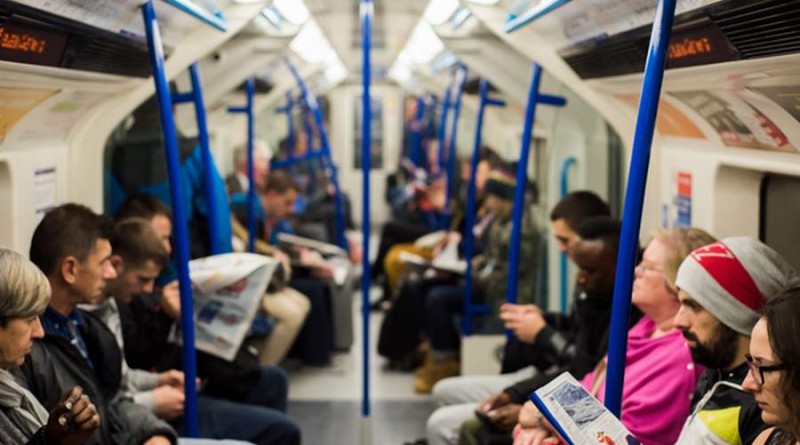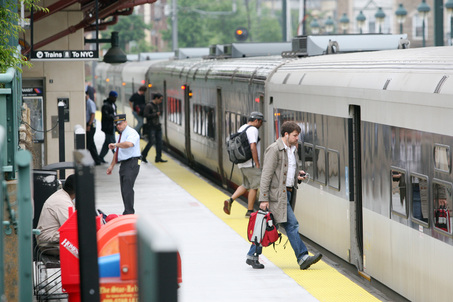[6 minute English] – Kỳ 1: The commute
Hundreds of millions of us make the same journey day in day out – the commute. Alice and Neil discuss the benefits of cycling to work and why sitting on the train may raise your blood pressure.
This week’s question
What did the word ‘commuter’ originally describe? Was it someone who…
a) travelled with other people?
b) paid a reduced fare to travel?
c) travelled by train to work?
You can hear the right answer at the end of the programme.
Vocabulary
foldaway bike
a bike that folds up so it’s easy to carry or put away
lycra
a stretchy fabric used in tight-fitting sports clothes
intrigued
very interested in something
commuting
travelling between your home and your work
the Tube
the subway (or underground) system in London
alert
being quick to notice things going on around you
belongings
things that you own
snatch
take quickly
nap
short sleep, especially during the day
traffic jam
a large number of vehicles close together moving slowly
packed in like sardines
people standing so close together that they can’t move
commuted
(here) reduced
Transcript
Note: This is not a word-for-word transcript
Neil
Hello and welcome to 6 Minute English. I’m Neil…
Alice
… and I’m Alice. Now Neil, how do you get to work?
Neil
I cycle.
Alice
I didn’t know that! Somehow I hadn’t imagined you as a cyclist. And where’s all your bike gear?
Neil
Well, I sneak in the mornings, have a shower, and get changed. That’s my bike in the corner over there.
Alice
Oh, you’ve got a foldaway bike – which means it folds up so it’s easy to carry or put away.Do you wear lycra, Neil?
Neil
Yes, I do… it’s very comfortable. I wear lycra as often as I can. Lycra by the way is a stretchy fabric used in tight-fitting sports clothes.
Alice
Well, I’ll have to see if I can catch you on your way into the building – I’m intrigued about this sporty Neil I didn’t know about!
Neil
‘Intrigued’ means to be very interested in something. Well, Alice, I’m flattered. And today’s show is about commuting – or travelling between your home and your work. So how did you commute this morning, Alice?
Alice
I got the Tube – that’s the subway system here in London, also known as the underground – and it was a nightmare. We stopped in a tunnel for so long that people started talking to each other.
Neil
And for those of you who aren’t Londoners, that’s unusual! Do you ever talk to people on the train?
Alice
No. People think you’re crazy if you talk to strangers.
Neil
Well, maybe now’s a good time to talk about today’s quiz question, Alice. What question do you have for me?
Alice
Alright then. I know you like my questions, Neil. So here we go: What did the word ‘commuter’ originally describe? Was it someone who…
a) travelled with other people?
b) paid a reduced fare to travel?
Or c) travelled by train to work?
Neil
Oh, that’s easy. I’m going to go for c) travelled by train to work.
Alice
Well, we’ll find out later whether you’re right or not. Now let’s listen to a commuter in Nairobi who takes a matatu to get to work. These are minibuses used as shared taxis in East Africa. Can you spot a word that means being quick to notice things going on around you?
INSERT
Commuter, Nairobi, Kenya
When I’m stuck in the matatu there is a lot of strange things happen around you, so you have to be alert in Nairobi. When you open… when you leave your window open somebody can run away with your belongings. You may be speaking… using the phone… somebody just snatch your phone… you may expect the unexpected!
Neil
The word used by this commuter in Kenya is alert. And in these noisy, crowded buses you need to be alert in case someone runs away with your belongings – belongings are the things that you own.
Alice
Right. Somebody might snatch your phone – snatch means to take something quickly.
Neil
Public transport in Nairobi sounds stressful! If I was taking the bus I’d want to have a nap – or short sleep.
Alice
Yes. Well, people have done research on commuting and stress levels – and interestingly women are more likely to experience stress during their journey than men.
Neil
Why’s that?
Alice
Well, they’re more likely to do something which is being called ‘trip chaining’ – where they make one or more stops on the way to work or going home – for example to drop off or pick up the kids from school – and this makes it more likely that something will go wrong with their journey.
Neil
Even if you aren’t trip chaining it’s no fun being stuck in a traffic jam – that’s a large number of vehicles close together moving slowly – or being packed into a crowded train like sardines. Let’s face it – travelling by car or by public transport can be really miserable!
Alice
Yes. Packed in like sardines describes people standing so close together that they can’t move – like fish in a can! So let’s hear how longer commutes can affect your health from US researcher Christine Hoehner.
INSERT
Christine Hoehner, researcher at Washington University School of Medicine
My study found that adults who commuted longer distances from home to work were less physically active, less physically fit, weighed more and had higher blood pressure than those people who had shorter commutes.
Neil
The American researcher must be talking about commuters who aren’t engaged in active travel, mustn’t she? Because if you cycle a longer distance then you’re being more physically active.
Alice
I think you’re right, for once, Neil!
Neil
Yeah.
Alice
And I’d better start going to the gym more. I don’t like the sound of high blood pressure.
Neil
Why don’t you hop on your bike, Alice? Then we can both wear lycra to work.
Alice
That’s a fantastic idea, Neil! Moving on! Here’s the answer to today’s quiz question. I asked: What did the word ‘commuter’ originally describe? Was it someone who… a) travelled with other people? b) paid a reduced fare to travel? Or c) travelled by train to work?
Neil
And I said c) travelled by train to work. It must be right.
Alice
And you were wrong I’m afraid, Neil! It’s b) someone who paid a reduced fare to travel. The Oxford Dictionary says the word ‘commute’ comes from Latin commutare, from com-‘altogether’ + mutare ‘to change’. The word was used in the US in the 1840s, when people paid a reduced or commuted fare to travel by rail from the suburbs into the city.
Neil
OK. Can you tell us the words we heard today again, Alice?
Alice
Of course I can. Here they are:
foldaway bike
lycra
intrigued
commuting
the Tube
alert
belongings
snatch
nap
traffic jam
packed in like sardines
commuted
Neil
Well, that’s the end of today’s journey with 6 Minute English. Please do join us again soon.
Both
Bye.
(Source: bbc.co.uk)





